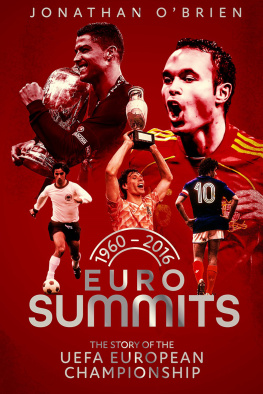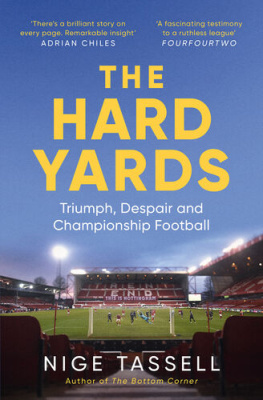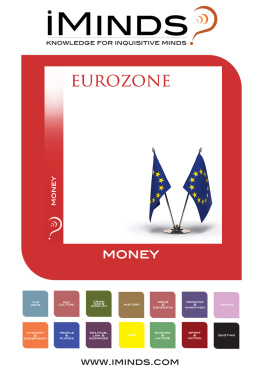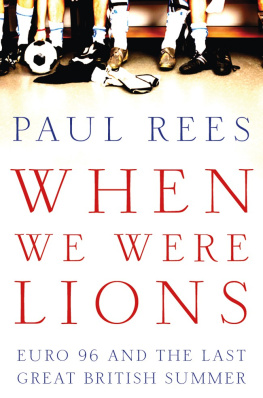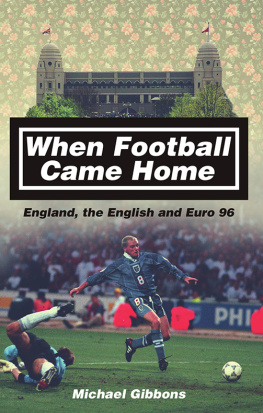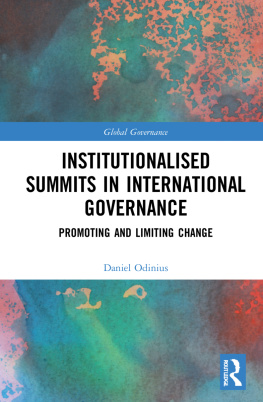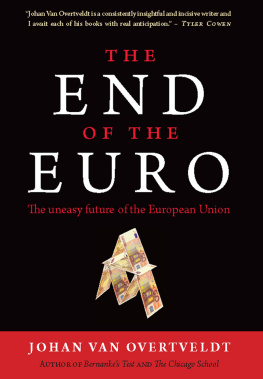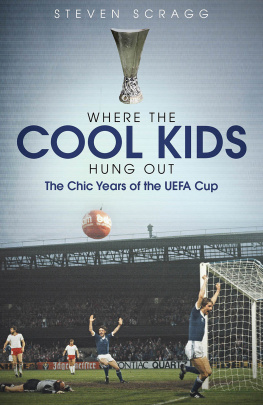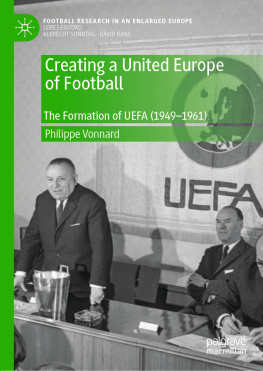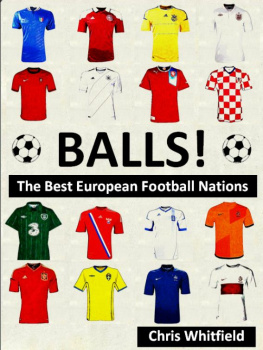
Spanning six decades and fifteen tournaments, Euro
Summits tells the complete story of the continents
greatest sporting showpiece, from its humble 1950s
beginnings in a Viennese hotel to its elephantine
present-day incarnation of 24 teams. Read how:
At the dawn of the Euros, the formidable Soviets initially
set the standard, before Spain handed General Franco a
propaganda coup on home soil in 1964

Inspired by the talismanic Gnter Netzer,
West Germany sweep all before them in 1972
but are scuppered by footballs most legendary
penalty four years later in Belgrade

The 1980s witness two stunning triumphs:
Frances team of all the talents in 1984 and
Rinus Michelss Dutch masters in 1988

Eleventh-hour guests Denmark sensationally seize the
moment in 1992, fuelled by Big Macs and fries

Football comes home in 1996, but a patched-up
Germany grab the glory at Wembley

2000 unfolds as the greatest international tournament of
the era, climaxing spectacularly as France dash the prize
from Italys hands with seconds to go

150/1 no-hopers at the outset, Greece pull off the
heist of the footballing century in 2004

In an age of Iberian dominance, Spain become the first
team to retain the trophy, before Portugal survive the
loss of Ronaldo to overcome France in 2016
First published by Pitch Publishing, 2021
Pitch Publishing
A2 Yeoman Gate
Yeoman Way
Durrington
BN13 3QZ
www.pitchpublishing.co.uk
Jonathan OBrian, 2021
Every effort has been made to trace the copyright.
Any oversight will be rectified in future editions at the earliest opportunity by the publisher.
All rights reserved under International and Pan-American Copyright Conventions. By payment of the required fees, you have been granted the non-exclusive, non-transferable right to access and read the text of this e-book on-screen. No part of this text may be reproduced, transmitted, downloaded, decompiled, reverse-engineered, or stored in or introduced into any information storage and retrieval system, in any form or by any means, whether electronic or mechanical, now known or hereinafter invented, without the express written permission of the Publisher.
A CIP catalogue record is available for this book from the British Library
Print ISBN 9781785318498
eBook ISBN 9781785319303
--
eBook Conversion by www.eBookPartnership.com
CONTENTS
ACKNOWLEDGEMENTS
THANKS, FIRST and foremost, to my wonderful wife Laura, and to my family, Brigette, Seamus, John, Colm, Caomhan, Gillian, Cyjan, Caoimhe and Radha not forgetting Diego and Tuco. Thanks, too, to Pitch Publishings Paul and Jane Camillin, Dean Rockett, Ivan Butler, Duncan Olner and Graham Hales, all of whom were a pleasure to work with.
Paul Howard, Maeve McLoughlin, Pat Pidgeon, Eoin OHara, Emmanuel Kehoe, Patrick Dempsey, Dermot Crowe, George Gaskin, Gerard Crowley, Damian Corless, Garvan Grant, Donal Bradley, Johnny Mooney, Emmett OReilly, Julian Fleming and Vincent Gribbin all provided huge encouragement along the way. Im indebted to Bojan Babi, Stephan Hattenhauer, Andy Hockley, David Melo, Maciej Somiski and Rozanne Stevens for their translation assistance; to Justin Hughes for his invaluable help with the Netherlands-related material; and to Cris Freddi, whose World Cup book served as the main inspiration for me to do this.
Last but not least, special thanks to Michael Gibbons, whos written a couple of terrific books himself, and whose generosity of spirit made the difference when it came to getting this one into print.
Jonathan OBrien
January 2021
THE BEGINNING
THE MORNING of 2 March 1955 is a cold one in Vienna. At the newly opened headquarters of Austrian football, the Haus des sterreichischen Fuballsports building on Mariahilfer Strae, the besuited top brass of the eight-month-old Union des Associations Europennes de Football are gathering to make some big decisions.
There are plenty of things on the agenda dates of fixtures for the European football calendar, the embryonic issue of television rights but the main order of business is the question of whether to create a European Cup for national teams. One of the people in the room is a 65-year-old Frenchman named Gabriel Hanot, the editor of the French sports newspaper Lquipe. Six months later, thanks chiefly to his efforts, the first edition of the European Cup itself will kick off with a fixture between Sporting Clube and Partizan Belgrade in Lisbon.
As the delegates file into the hall in Vienna and take their seats, one chair in the room is left conspicuously empty. Many miles to the west, in Paris, another Frenchman is lying in his sickbed, grappling with a grave illness that will kill him a matter of months later, and worsening his health further by fretting about what will happen in his physical absence from the meeting that he has worked for years to set up.
Some hours later, the gathering breaks up. On the substantive issue, the verdict is that there is no verdict.

The morning of 21 December 2015 is an even colder one in Zrich. UEFA president Michel Platini, for so many years the arrogant and untouchable dauphin of European football, has just become its most notorious pariah.
FIFAs ethics committee has scuppered Platinis future political ambitions in devastating fashion, hitting him with an eight-year ban (later reduced to six on appeal) as punishment for pocketing a seven-figure bung from the similarly disgraced Sepp Blatter. In the aftermath, Platini blusters manfully about a pure masquerade of a decision, rigged to tarnish my name by bodies I know well, but his once rocket-propelled career now lies in ruins.
Four weeks before Euro 2016 kicks off in Paris, Platinis final appeal to the Court of Arbitration for Sport in Lausanne succeeds only in getting his six-year ban cut further to four years. He formally quits as UEFA president later that day. I take note of todays decision from CAS, but I see it as a profound injustice, he says in a statement. I am resigning from my duties as UEFA president to pursue my battle in front of the Swiss courts to prove my innocence in this case. Life is always full of surprises I am henceforth available to experience more of them.

